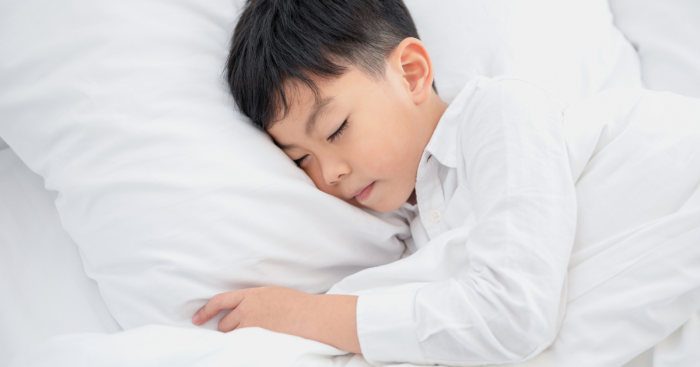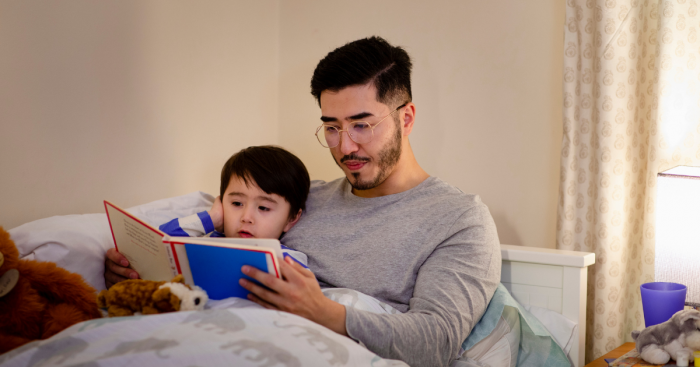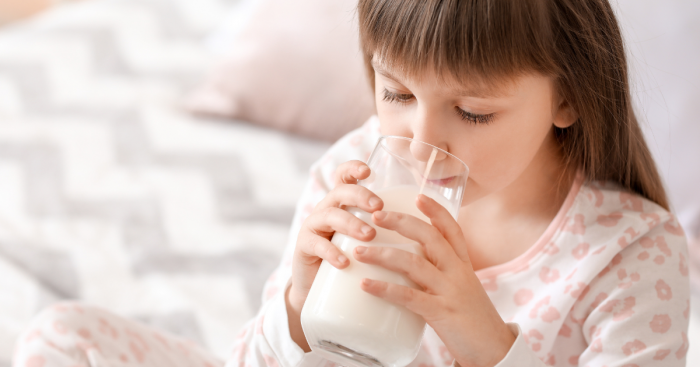Sleep is a time for the body to restore and recharge itself. During sleep, especially at the deep non-REM (Rapid Eye Movement) sleep stages, many biological processes[1] take place. The brain stores new information, gets rid of toxic waste, nerve cells communicate and reorganize and the body repairs cells, restores energy and releases molecules like hormones and proteins. In children, sleep is especially essential as 75% of their growth and brain development[2] takes place during deep sleep.
Even as adults, when we don’t get enough sleep, we are tired, sleepy, moody and irritable. We can’t concentrate and seem to have slower thinking and reflexes. We may even hallucinate and become delirious[3] if sleep is deprived over long periods .
The same can happen with children. Sleep deprivation stifles their immune system and negatively affects their mood, behaviour and performance in school. According to the CDC[4], children who don’t get enough sleep are more likely to develop Type 2 Diabetes, obesity, poor mental health, poor attention, memory, concentration and other behavioral problems.
However, the converse is true for children who get adequate amounts of sleep. Studies have shown that children who sleep enough hours every night have improved attention, behaviour, learning, memory, and overall mental and physical health.
How Much Sleep Do Children Need According to their Ages?

Every child’s sleep requirement is different and sleep patterns and behaviours change from birth to adulthood. On a general basis, the table below gives the overall guide for recommended total sleep per day[5].
- Newborns: 0 to 1 Year – 16 hours
- Toddlers:1 to 2 years – 11 to 14 hours
- Preschoolers: 3 to 5 years – 10 to 13 hours
- School-aged: 6 to 13 years – 9 to 11 hours
- Teenagers: 14 to 17 years – 8 to 10 hours
Why Some Children Have Sleep Problems

There are many reasons why children develop sleep problems. Some of these reasons include:
- Teething or Toothache[6] − Teething is an uncomfortable time for children. Most children begin developing teeth between the ages of six and 12 months and get all their baby teeth in by age three. The gum soreness, mouth rash, swelling, drooling, mild temperature, increased biting, gum rubbing and even ear rubbing are enough to disrupt their sleep in the middle of the night. The same can be said for tooth decay and oral issues. The pain is acute, chronic and persistent. The sharp and throbbing tooth pain goes deep inside the jaw and even causes earache, sore throat, a headache and possibly a fever.
- Illness and Health Issues − stuffy nose, fever, sore throat, eczema, gastrointestinal problems can cause children to have sleep difficulties.
- Effects of Medication – some can interfere with sleep.
- Genetics and Age[7] – All children are born with different temperaments and dispositions. Generally speaking, babies who are fussy and irritable are more likely to develop sleep problems later in childhood. However, as they grow older, their brains may be able to process settling down at night
- Growth Spurts[8] – Children go through growth spurts which are short periods of time when the child experiences physical growth in height and weight. Suddenly you notice they have outgrown their clothes and shoes and have gained a couple of inches over the course of a few months. Growth spurts are sometimes accompanied by growing pains, a sign that the bones are elongating. They get a dull ache or throb in the legs, often in the thighs, calves, shin and behind the knee and these pains often occur at night which may wake the child from sleep.
- Screen Time[9] – Overuse of screens such as mobile phones, tablets, televisions, computer monitors and videogame consoles can affect the sleep-wake cycle. Screen light stimulates the brain and suppresses melatonin production resulting in the inability to fall asleep. Melatonin is a hormone[10] that the brain produces in response to darkness.
- Nightmares or Night Terrors[11] – Night terrors and nightmares are most common in children between the ages of three to 12. They usually happen an hour or two after the child falls asleep. They may wake up screaming, crying, or thrashing in fear. Naturally, this disrupts their sleep. There is no known cause but may be triggered by fever, overtiredness, overstimulation from playing computer, video or phone games or watching too much TV, lack of sleep, emotional tension, stress or conflict in the home or in school.
- Developmental Leaps[12] – A child’s first three years of life are filled with developmental milestones and leaps. Every milestone he achieves such as learning to roll over, crawl, walk etc, can cause him to be more wakeful at night and nap shorter during the day.
- Anxiety and Stress[13] – Problems with friends, bullying, or peer group pressures, changing schools, moving, exam stress, having negative thoughts about themselves, going through body changes etc are some of the anxiety and stress children go through in their young lives. Anxiety and stress are frequently connected to sleeping problems. Excess worry and fear make it harder to fall asleep and stay asleep through the night. Sleep deprivation can worsen anxiety, spurring a negative cycle involving insomnia and anxiety disorders.
- Emotional Distress[14] – Emotional problems can certainly cause sleep disorders in children. Tensions at home like domestic violence, separation of parents, death of a loved one or any mental suffering caused by an event or condition can cause frequent nightmares or an inability to fall asleep and stay asleep.
- Sensory Processing Challenges[15] – a child who has difficulty processing sensory input (from vision, hearing, taste, and smell) may experience brain and nerve overstimulation that may prohibit falling asleep easily.
- Physical Activity Level[16] – Children who have low physical fitness or who do insufficient physical activity during the day are associated with poor sleep quality.
- Exposure to Sunlight[17] − As opposed to blue light from screens that suppress melatonin production, exposure to sunlight especially morning light helps regulate sleeping patterns. Morning light signals the brain to “wake up” and set the circadian rhythm for the day.
- Bedtime Routine[18] − Children who have inconsistent bedtime routines tend to develop sleep problems. The body finds difficulty adjusting to the changing times for settling down and falling asleep.
- Feeling Uncomfortable – Discomfort like sleeping in an uncomfortable bed or feeling too hot or too cold or too cramped makes a child toss and turn at bed time.
- Too Much Sugary Food, Caffeine, Fatty Foods − Everybody knows caffeine keeps people awake and lots of children’s foods contain caffeine. Sodas and energy drinks for example and tea and coffee contain caffeine. Too much intake of sugar throughout the day through food and beverages can also give children a “sugar high” and cause sleep disorders and inflammation, especially in breathing for young children.
- Parenting Methods[19] – Parents who stay with the child until he falls asleep tend to have children with sleep problems. The child can only fall asleep when he has the security of the parent beside him. If he awakes in the middle of the night and the parent isn’t there, he will have difficulty falling back to sleep again.
- Noise − Living in noisy neighbourhoods, having the TV on loud when the child can hear the sounds in the hall, living in loud households can cause a child to have sleep difficulties.
How Parents can help their Children Develop Good Sleep Hygiene

Sleep hygiene refers to good habits, practices and behaviours that can help a child improve their quantity and quality of sleep. It sets the stage for a more relaxed and successful family relationship as it lessens bedtime resistance and conflicts. Here are 10 strategies[20] that can help a child develop good sleep hygiene:
1: Maintain Consistency with both Bedtime and Wake-up Time
All children have individualized sleep patterns despite what the Table for Sleep Requirements above says. Generally, a preschooler will need 10 to 13 hours of sleep (inclusive of day naps) every day. However, an early riser will wake up early even if you put them to bed late. That’s why it is important for parents to work with their children to see what timing works best for them. Once that is worked out, set the sleep and wake-up times throughout the week, even during weekends and holidays. A regular sleep schedule will help the child’s natural biological clock to know when it is bedtime and wake-up time.
2: Set-Up a Predictable Bedtime Routine
Setting up a consistent and predictable bedtime routine such as brushing teeth, putting on pajamas, bedtime story and lights out provide familiarity and routine to the child. He will learn to know that the time has come for him to go to bed and his body will adjust automatically to the cues and start getting sleepy.
3: Avoid Spending Too Much Time in Bed
Associate the bed with sleep only and not as a place for non-sleep activities such as play. When the child sees the bed, he will know that it is time to sleep (and not play).
4: Avoid Stimulating Activities including using Digital Devices Before Bedtime
Avoid highly stimulating activities before bed such as exercises or exhilarating games like chasing, jumping and screaming. Avoid video games or TV. Ideally, remove all electronics and digital devices from the bedroom. In fact, turn off all screens at least two hours before bedtime to wind down the body as playing on screens just before bed can keep the child up for an extra 30 to 60 minutes. Not only that, it can contribute to nightmares and frequent waking up at night if the child is exposed to violent and frightening content.
5: Help Your Child Relax and Wind Down
Instead of trying to put them to sleep with television, regardless of type of content it may be showing, try reading them a bedtime story or practice deep breathing to calm their body down. For children who know how to count, tell them to breathe through their nose for four seconds, hold for five seconds and exhale through thee mouth for six seconds. Younger children can just practice taking long, deep breaths in and out.
6: Maintain a Sleep-Inducing Environment
A child’s sleeping place should be comfortable, cool, relatively quiet and dark enough for him to fall asleep quickly and with less help. For children of pre-school age and younger, the lights should be dimmed an hour before bedtime. There should be no distractions in the room, such as sleeping with a pet. The pet, like hamsters, tend to get active at night and the noise they make running around in their cages, may prevent the child from sleeping. He can, however, have security objects such as soft toys that can help him feel safe and secure when you leave him to fall asleep.
7: Exercise During the Day
Exercise burns up latent energy. While it provides many other positives such as physical and mental well-being, physical activity can promote sleep at night.
8: Schedule a “Worry” Time
Yes, there is stress in childhood. Tensions at home, parental conflict and pressures, death of a loved one, worrying about schoolwork and exams, problems with friends, bullying, peer group pressures, transitioning to daycare, kindergarten, new school and so on create anxiety on the child. A lot of children tend to be worriers in bed. It can be helpful to schedule a “Worry Time” for children to share their worries and concerns with their parents earlier in the day so that they don’t take their anxieties to bed.
9: Teach Your Child to Fall Asleep on His Own
Children should be put to bed when they appear tired but still awake rather than letting them fall asleep in your arms or elsewhere other than his own bed. Avoid getting into bed with your child in order to get them to sleep. Otherwise you would have to spend a lot of time everyday having to stay there with him, leaving no time for your own rest time.
10: Nutrition can Help Fix Sleep Problems − Drink Milk

One often overlooked component related to good sleep is what the child eats. Nutrition[21] plays a big role in promoting healthy sleep. A balanced and adequate diet consisting of lean proteins, good quality fats, whole grains and fruits and vegetables support sleep as they can help counteract dips in blood sugar during the night. Low blood sugar can cause the hormone adrenaline[22] to be released which makes the body more alert and can cause sleep disturbances. Other nutrients that will help with sleep include complex B vitamins and the amino acid tryptophan. They support the production of melatonin which helps wind the body down to a sleep-ready stage.
Milk has traditionally been known as the go-to beverage to put children to sleep. This is because milk contains tryptophan[23]. Once tryptophan is consumed, the body turns it into Niacin, a B Vitamin that plays a key role in creating serotonin[24] − a neurotransmitter that is associated with sleep and melatonin production.
Of course, tryptophan is also found in other foods such as eggs, turkey, bananas, oats, chicken and kidney beans.
Morinaga Chil-kid

Morinaga Chil-kid is a Japanese growing-up formula that has specially been designed for Asian children aged one to seven. The milk has a mild vanilla taste and is enriched with 45 essential nutrients such as ARA+ DHA, GOS, 5 Nucleotides, Omega 3&6 LCPs, Minerals and 27 Vitamins including the B Vitamins and Niacin.
Two to three glasses a day complemented by balanced meals supply children their complete nutritional needs for optimum growth and development. To find out more about Morinaga Chil-kid, do read here.





